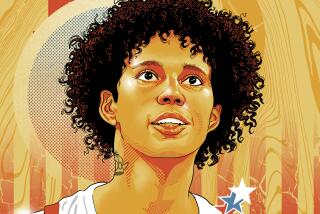THE SUMMIT AT GENEVA : Reporter’s Notebook : An Unexpected Emigre Dismays Soviets
- Share via
GENEVA — Soviet officials do not hold news conferences very often and, when they do, they do not expect dissidents to show up. That is why they reacted with both surprise and disdain Sunday when Irina Grivnina arose at a pre-summit news conference here to protest loudly in Russian against Soviet human rights practices.
Grivnina, who emigrated from the Soviet Union only three weeks ago after spending almost three years in prison and a labor camp, is accredited to cover the summit as a reporter for a Dutch weekly newspaper.
“I want to talk about human rights!” she shouted. “How many people have you imprisoned for anti-Soviet activity? I suspect around 1,000.” She said a close friend of hers, a psychiatrist, is dying in a labor camp.
After insisting that the subject of their news conference was arms control, not human rights, the officials finally replied to her. They denied that there are any political prisoners in the Soviet Union.
“As for your friend,” Leonid M. Zamyatin, a Kremlin spokesman, said, “I am afraid that I don’t know anyone in your circle of friends.” He said that if she persisted in shouting at them, they would walk out and end the news conference.
An exasperated Nikolai Glasov, another Kremlin spokesman, then warned, “Do we have to call the Swiss militia to remove this lady?” But Grivnina, evidently satisfied with her long interruption, quietly sat down. She later handed out press releases about her friend to journalists crowding around her.
The journalist attracting the most attention here is Ronald Reagan Jr., who received press card No. 2829. Playboy magazine has hired him to cover the summit conference.
“As a sometime ballet dancer and entertainments reporter,” commented the London Sunday Times, “he is as qualified to do so as most.”
After arriving in Geneva on Saturday night, the President and First Lady headed straight for the Maison de Saussure along Lake Geneva in suburban Creux-de-Genthood as everyone in Geneva knew they would. The mansion, constructed in the 18th Century for a minister and book collector and now the residence of the Aga Khan, will serve as their home during their stay for the summit.
Officially, there has been a mystery for weeks in Geneva about where the Reagans would stay. The Swiss government, for security reasons, refused to say.
But no one in Geneva had any doubts. President Eisenhower stayed at Saussure during the Big Four summit, when British, French, Soviet and U.S. leaders met in Geneva in 1955. The owner of a nearby local restaurant told friends that Swiss and American secret servicemen and knowledgeable television journalists had reserved every place in his restaurant from Nov. 12 to Nov. 22. Geneva newspapers kept publishing photos of the mansion.
When the Reagans arrived, Swiss television commentators said they would, of course, go to Saussure. And they did.
Pacifist, leftist, religious and nationalist organizations had a difficult time putting together their demonstration for peace on Saturday. Many organizers felt that political banners attacking either the United States or the Soviet Union should be banned. But, in the end, most reluctantly accepted them.
However, Jewish organizations, concerned that the parade would have a leftist hue, refused to take part and staged their own protest on Sunday against Soviet treatment of Jews.
Many religious groups, including Jews, also took part Sunday in a special service for peace in the cathedral in which Protestant leader John Calvin preached almost 500 years ago. The St. Pierre Cathedral, constructed as a Roman Catholic cathedral but now the seat of the Swiss Reformed Church, dominates the medieval quarter of Geneva.
Times staff writers William J. Eaton and Don Cook, in Geneva, contributed to this story.
More to Read
Sign up for Essential California
The most important California stories and recommendations in your inbox every morning.
You may occasionally receive promotional content from the Los Angeles Times.













